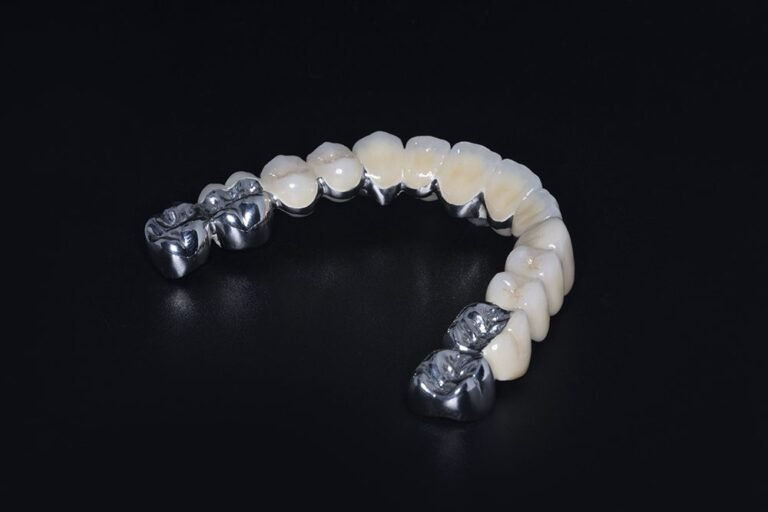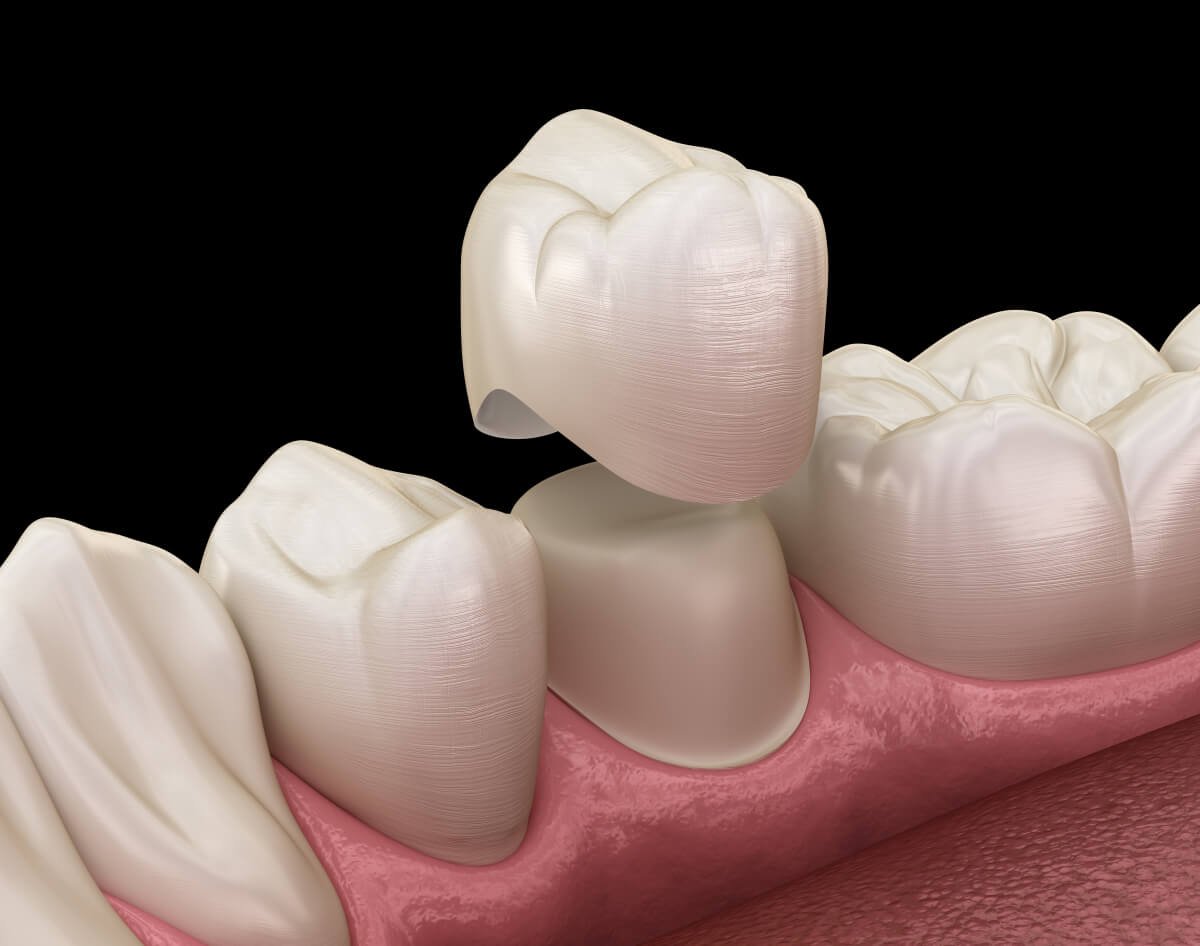Dental Crowns in Tempe, AZ
If you have a damaged or decayed tooth, a dental crown may be the best course of action to restore your smile and protect your natural teeth. Dental crowns are designed to fit seamlessly over an existing tooth, creating a beautiful smile and reinforcing your overall dental health.

Durable, Natural-Looking Protection
Why Choose Dental Crowns?
Dental crowns restore damaged teeth, providing durability, function, and a natural look. They protect your smile while ensuring long-lasting comfort and confidence.
Solution to Restore Damaged Teeth
Crowns provide a sturdy barrier for teeth affected by decay, cracks, or root canal procedures.
Natural Appearance
Porcelain crowns, zirconia crowns, or metal crowns (like gold alloys or pfm crowns) are crafted to match the shade and contour of your existing teeth, preserving the beauty of your smile.
Long-Lasting Results
Modern dental crowns offer an effective way to shield damaged teeth—with proper care, crowns can last for many years.
Enhanced Comfort
A custom dental crown can protect and stabilize a tooth that might otherwise cause discomfort or complications.

(602) 999-8888
Types of Crowns at IGO Dental
Our dentist in Tempe will help determine if a dental crown of a certain material aligns with your dental needs and aesthetic goals.

Porcelain-Fused-to-Metal (PFM) Crowns
Known for their durability, combining a metal substructure with a porcelain exterior for a balance of strength and natural appearance.

Ceramic Crowns
Often made entirely of porcelain, these crowns are a great choice for front teeth, offering a highly aesthetic look.

Zirconia Crowns
Crowns are known for resilience and lifelike transparency, making them ideal for those seeking a beautiful smile with extra toughness.

Metal Crowns
Commonly used for molars because metal crowns can endure heavy biting forces. While not as discreet, they’re extremely durable.
Getting a Dental Crown: What to Expect

Consultation & Assessment
Our dentist may recommend a crown after diagnosing a damaged or decayed tooth or following a root canal. We’ll explore how dental crowns can help you decide if a dental crown is the best path.

Preparation
A small portion of the tooth is reshaped to make room for the crown to protect it. A temporary crown may be placed to protect your tooth while the final crown is being fabricated.

Dental Lab Fabrication
The type of dental crown (e.g., porcelain crowns or ceramic crowns) is used to create your custom restoration in a dental lab. Once your custom dental crown is ready, we’ll schedule a fitting.

Placement & Bonding
After ensuring an ideal fit, the crown restores the tooth by being bonded permanently, giving you a renewed confidence to smile.
Caring for Your Dental Crown
Visit your dentist regularly for cleanings and exams—dental crowns can last longer with preventative care.
Maintain a healthy smile by practicing good oral hygiene, preventing decay around the crown margins.
Though crowns are durable, biting ice or hard objects can cause chips or fractures.
If you notice sensitivity or movement around the crown, follow up to ensure the restoration remains secure.
Dental crowns can help you reclaim the look of your smile and protect any damaged or decayed tooth. From temporary crown placement to the final dental crown procedure, our dental team guides you every step of the way. Crowns are often recommended when other dental treatments aren’t enough to restore your smile—and they’re generally an excellent choice for preserving natural teeth while boosting self-assurance.
Schedule an appointment today to discover how dental crowns can transform your unique dental situation into a confident, healthy smile. Our dental crown services are designed to deliver the benefits of dental crowns—strength, longevity, and a natural appearance—so you can enjoy the beauty of your smile for years to come!
FAQ's
Got Questions? We've Got Answers!
A dental crown is a custom dental crown (often porcelain crowns, metal crowns, or zirconia crowns) that covers a damaged or decayed tooth to restore your smile. Crowns are designed to match your natural teeth, improving both the appearance of your smile and your dental health. You may need a dental crown if your tooth has severe decay, has undergone a root canal, or requires extra support.
Crowns provide a sturdy layer over your damaged or decayed tooth, preventing further decay or fractures. A crown to protect the tooth is often the best course when simpler dental treatments like a dental filling aren’t enough. This dental crown helps you maintain a healthy smile and avoid additional dental issues.
Types of crowns include porcelain-fused-to-metal (pfm crowns), all-porcelain or ceramic crowns, metal crowns, and zirconia crowns. Each type of dental restoration has unique advantages—like natural appearance, durability, or affordability. Your dentist may recommend the type of dental crown that aligns best with your dental needs and aesthetic goals.
The dental crown procedure starts with preparation: your dentist reshapes the tooth and may place a temporary crown to protect it while the final crown is being fabricated. Once your custom dental crown is ready, it’s bonded onto your tooth to restore function, confidence to smile, and the beauty of your smile.
A dental crown is designed to cover just one damaged or decayed tooth, so it generally won’t impact adjacent natural teeth. However, your dentist might need to remove a small portion of enamel to ensure the crown fits snugly. The goal is to protect your tooth without compromising the look of your smile.
Modern dental crowns can last anywhere from 5 to 15 years—or even longer—depending on the type of dental crown, your oral hygiene, and how well you care for your crowns are durable but not indestructible. Regular dental office checkups and good brushing and flossing habits help maximize longevity.
Often, yes. A root canal can leave a tooth structurally weak, so placing a dental crown provides the extra support needed to restore your smile fully. Crowns are often recommended to keep the tooth from cracking and to maintain a natural appearance in your overall healthy smile.
Absolutely. Dental implants replace missing tooth roots, and a dental crown is placed atop the implant to complete the restoration. This crown restores the function and appearance of your smile, seamlessly blending with your existing natural teeth for a beautiful smile makeover.
A loose or lost dental crown is a sign it may need re-cementing or replacing. Contact your dentist promptly to avoid further damage to the tooth underneath. In the meantime, keep the area clean and avoid biting down on that side if possible.
Regular dental visits, daily brushing, and flossing are crucial. Avoid chewing on overly hard objects, as crowns are also susceptible to chips or fractures under excessive force. With this proper care, crowns can restore your smile for many years and help you maintain the confidence to smile day in and day out.
